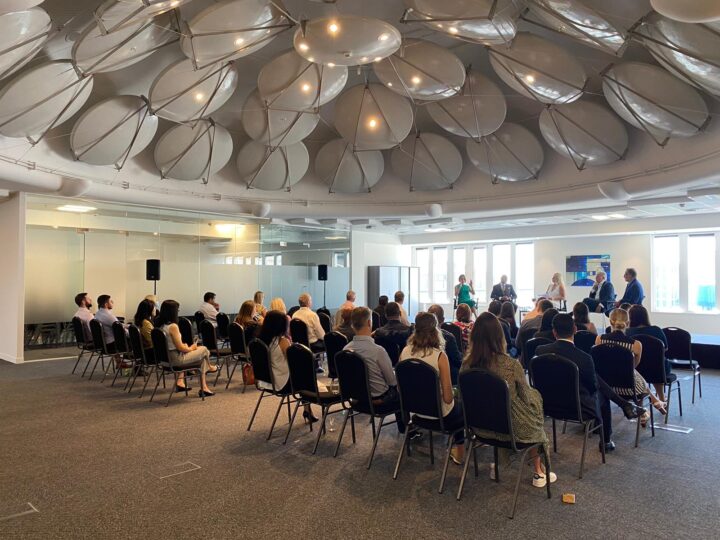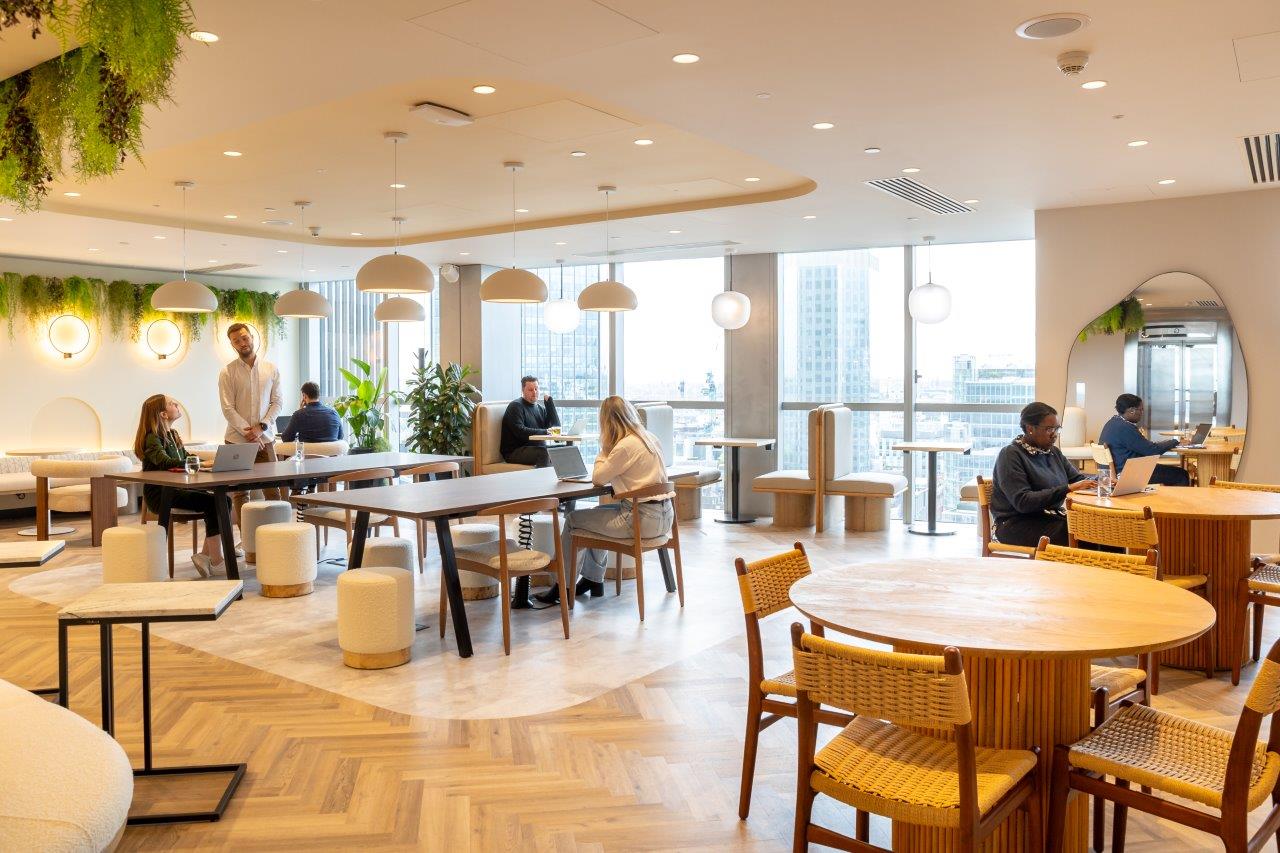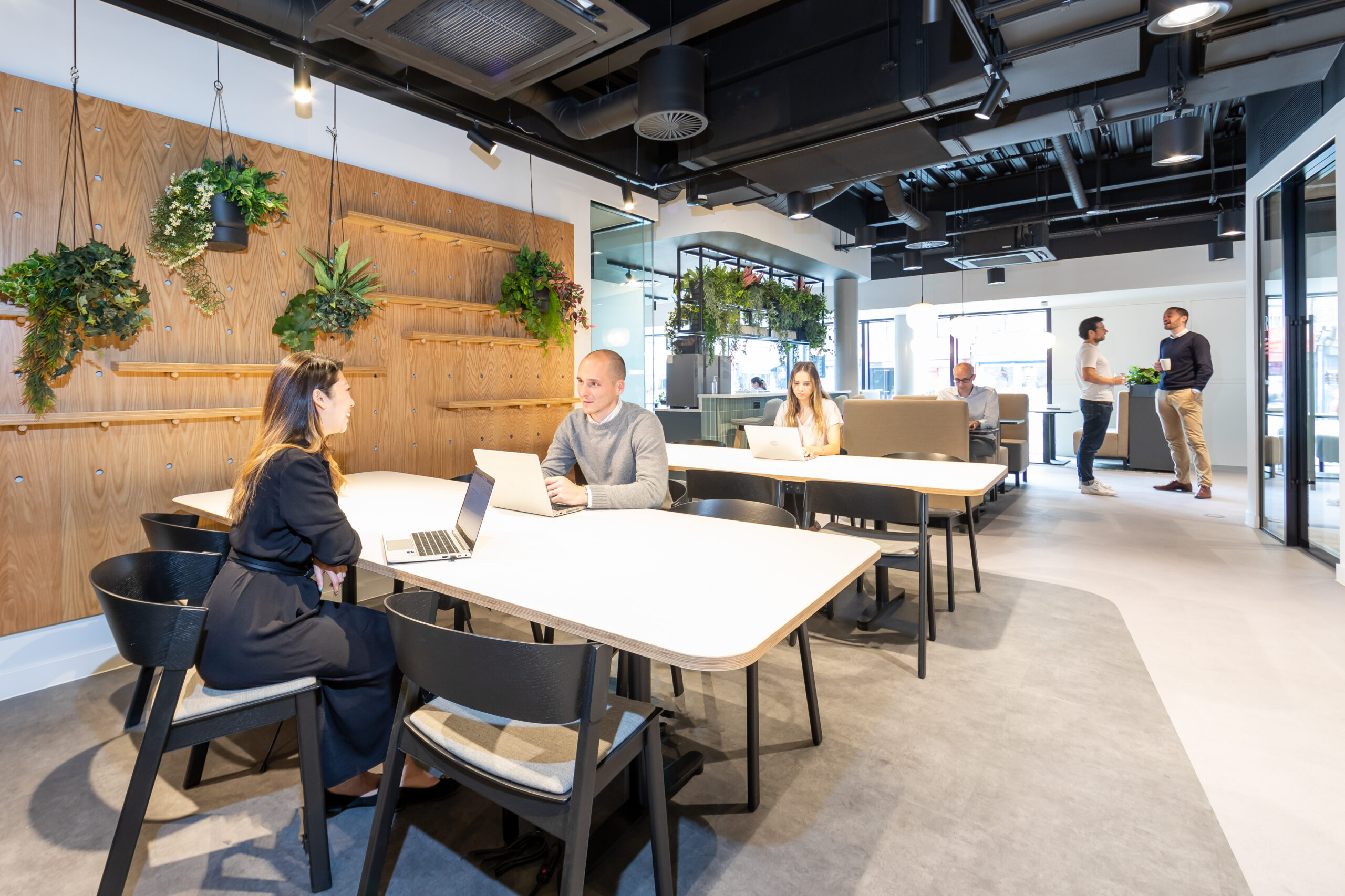Top 5 Takeaways from Landmark’s ‘Future of Work’ Panel
30th September 2021

How do we adapt to the changes happening all around us while setting ourselves, our teams and our businesses up for success in the future of work? Landmark Director Frankie Chrysanthou summed it up well during her introductory remarks at our client event earlier in this month: “What is key is adaptability. It’s not just the space we work in, but how we work.”
At this event, we hosted a panel discussion surrounding these issues and what to expect moving forward. The panel was emceed by published author and keynote speaker on AI Katie King and featured four experts representing different industries and backgrounds: Alison Conway, Group Head of Strategic Development at Trust Payments; Rafaat Rahmani, Founder and President of Lifescience Dynamics; Paul Russell, Digital Transformation Coach and Founder of Evenifitwasfree; and David Kinnaird, CCO of Essensys.
These were their top 5 lessons for preparing for the next phase of our working lives.
1. Adjust Your Mindset
For businesses in almost every industry, adapting to changes in the marketplace and constantly iterating are part of the modus operandi. But never before have we been asked to adapt to so much so quickly as we have over the past year and a half. We have known for a long time that change was coming, as threats of disruption loomed quietly in the background. The pandemic threw us a curve and suddenly changes that seemed far down the line, such as digital transformation and new working models, were quickly brought to the forefront. We were also given a choice: Sink or swim.
In her introduction to the panel discussion, emcee Katie King emphasised the importance of remaining resilient and continuing to push ahead. Her advice is: “Whatever level you are at in your company or your career, you have to keep adapting. Don’t be frightened of technology and of change. We are all learning as we go along; we adapted to COVID and we must continuously adjust to new technologies. Don’t have imposter syndrome. We are all on a journey and it’s about mindset. It’s about being open to change, bringing your teams with you. We have no choice because we cannot afford to ignore technology like AI anymore.”
2. Lead with Compassion
The pandemic presented mental, emotional, economic, and other challenges for most of us. As a result, we have all become a bit more empathetic to the struggles of others. Many of our panellists agree that human-centric leadership needs to become a priority not only during these periods of remaining strife, but throughout the rebuilding processes.
Two Landmark clients joined the panel to provide first-hand insights into their challenges and responses. For both Alison Conway’s Trust Payments and Rafaat Rahmani’s Lifescience Dynamics, honesty, empathy, compassion, and team morale took precedence.
“I think one of the key successes for us has been maintaining a degree of humility,” Conway shared. “Saying, ‘Look, we’re all in this together. We don’t know what it’s going to look like. We don’t have all the answers, but here’s our initial plan and what we’re going to be doing.’ We make sure we regularly touch base. We have an open environment, and we ask questions.”
Rahmani’s goal was to maintain as much normalcy as possible for his team. “As a compassionate and human company, we did not put anybody on furlough, and we did not freeze any spending. We did not stop any promotions for anyone who deserved one. That inevitably led to some challenges with Finance and HR, but it was the right thing to do. Before the pandemic, we met three times per year as a company. It’s things like that that allow us to have that family feel and sense of community as a human company. That enabled us to develop our own customs, rituals, traditions and culture. That is a definitely challenge with remote working.”
Maintaining culture and morale will be a difficult task moving forward, especially if team will be split up between the office and remote locations. But it is important to put your people first on this journey and to remember that we are all human. You may not always have the right answers as Conway pointed out, but by becoming the type of ‘human company’ Rahmani described, it will become much easier to support the staff you already have and welcome new hires into the fold when the time comes.
3. Embrace Flexibility
Hybrid work was a hot topic for the panel, as many businesses are finalising their strategies and welcoming staff back to their offices at least part of the time. For Rahmani, the top priority for adopting hybrid and remote work has always been the safety of his team. Conway and her team were enjoying the benefits of remote work at the height of lockdown, but as time wore on, they began to miss the comradery of the office environment. Both organisations intend to adopt hybrid models for their teams, at least for the foreseeable future. Paul Russell and David Kinnaird, the tech experts on the panel, both agree that remote working will be here to stay at least in some form for most organisations. Kinnaird believes that we have grown too accustomed to accomplishing tasks such as seeing our GP and attending university lectures remotely to turn back now.
Rather than fight against this change, embrace it. If your people are missing the experience of working in the office environment, offering the option to work from a Landmark centre or club space offers a strong alternative. Meet your people where they are and do what you can to support them working in a way that suits them best.
4. Treat Tech as a Friend, not a Foe
King, Russell, and Kinnaird all spoke on the inevitability of disruptive technologies in the workplace. “This is the time to really understand it,” Russell said. “If we leave it too long, we will probably flip back. When we understand that, the role of technology can really make a difference.” For Kinnaird, this will be facilitated by the availability of data as we shift to a more digitally driven culture in both our personal and professional lives.
Instead of battling against this transformation, embrace it. Russell suggests that this change can start small, with the smartphones we all already carry. With time, you can ease yourself and your team into more advanced tools, but it is important to understand that tech is a tool to assist rather than replace. This is a lesson we learned during the pandemic, as technology enabled us to continue doing our jobs remotely. There is much more potential that can be unleashed in the workplace. Expect to see organisations tapping into that moving forward.
5. Keep Learning
Of course, to keep up with the changes and help develop a more open mind, it is important to avoid complacency. There will always be new things to learn and new ways to futureproof. King stressed the value of seeking out these opportunities in her closing remarks. “Landmark is a progressive organisation bringing us all together to keep learning. I think that’s really important from your workspace provider that they are not only giving you flexible workspace but bringing everyone up to speed and adding value to what they do as an organisation and giving clients the opportunity to learn from the brilliant brains in the room.”

